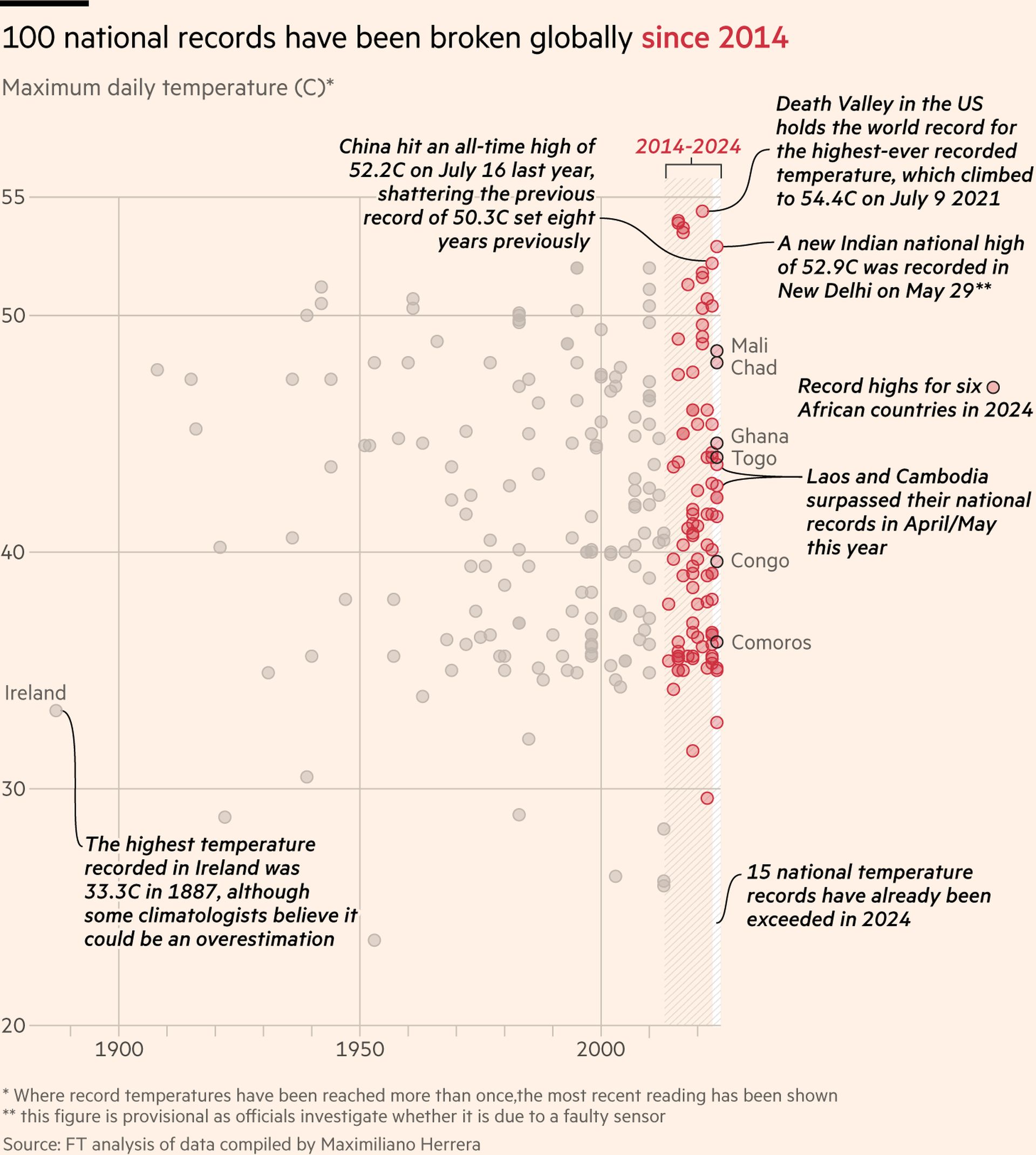
The world experienced its hottest year in 2023, with “climate records tumbling like dominoes” as the global average temperature reached almost 1.5C above pre-industrial levels, the European earth observation agency has said.
Scientists from the Copernicus climate change service said that last year marked the first since records began in which every day was at least 1C warmer than pre-industrial levels, before human-induced climate change began to take effect.
Almost half of the days of 2023 were 1.5C warmer, while two days in November were more than 2C hotter.
The “unprecedented” global temperatures from June last year meant the average daily temperature of 14.98C was 0.17C higher than the previous hottest year of 2016, Copernicus said.
Nick Dunstone, a climate scientist at the UK Met Office, said 2024 would be “another record-breaking year”, as a result of the continued strength of the naturally occurring El Niño effect, which heats the Pacific Ocean surface and exacerbates global warming caused by greenhouse gases.
The continued rise of greenhouse gases was “by far and away the largest contribution to global temperatures”, Copernicus deputy director Samantha Burgess said, with El Niño just “part of the story”.
Under the 2015 Paris agreement, countries committed to limiting long-term temperature rises to well below 2C and ideally to 1.5C above pre-industrial levels.
Although earth reached these temperatures repeatedly last year, those were short-term breaches and did not mean countries had failed to uphold the agreement on the long-term global average, Copernicus pointed out. But it warned that the high temperatures set “a dire precedent”.
“Following the current trajectory, in a few years time the record breaking year of 2023 will probably be remembered as a cool year,” said Carlo Buontempo, director of the Copernicus climate change service.
Mauro Facchini, head of earth observation at the European Commission’s directorate general for defence industry and space, said the data showed “yet more evidence of the increasing impacts of climate change”.
Scientists have warned that extreme weather events would become more frequent and intense as global warming continues and that urgent action must be taken to cut greenhouse gas emissions by almost 45 per cent by 2030 to limit warming to within 1.5C. It is now on track for almost 3C.
“Every tenth of a degree matters,” said Friederike Otto, senior lecturer in climate science at Imperial College London’s Grantham Institute. “Aiming to keep warming to 1.5C is more important than ever. But even if we end up at 1.6C instead, it will be so much better than giving up and not trying and ending up close to 3C, which is where current policies would bring us to.”
Earth experienced its hottest summer ever last year, with heatwaves, wildfires and flooding devastating many parts of the world, showing that governments were unprepared for the consequences of climate change, Otto said.
Last month also ranked as the warmest December on record, making it the seventh month in a row to break records. The average temperature in December was 13.51C, 1.78C above the 1850-1900 level for the month.
The historical and permanent nature of climate change reflected in the data was emphasised by Copernicus. “Temperatures during 2023 likely exceed those of any period in at least the last 100,000 years,” Burgess said.
A breach of the long-term 1.5C limit is increasingly likely, she added. “We are likely to overshoot 1.5C . . . That’s the basic physics of the system and the amount of warming that is locked into the system.”
The scientist said global average sea surface temperatures were unusually high in 2023, reaching record levels for the time of year from April through December.
The El Niño effect has helped drive the higher temperatures over the past six months, but Copernicus said the natural phenomenon did not explain all of the increase in ocean surface temperatures, with record high sea surface temperatures outside of the equatorial Pacific as well.
The Hunga Tonga Hunga Ha’apai volcano eruption in 2022 also contributed to last year’s warming, as it released a plume of water vapour which helped trap heat in the atmosphere.
Copernicus scientists observed that greenhouse gas concentrations have reached the highest levels ever recorded in the atmosphere, at 422 parts per million against an annual average of 280 ppm before the industrial era.